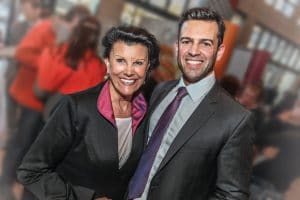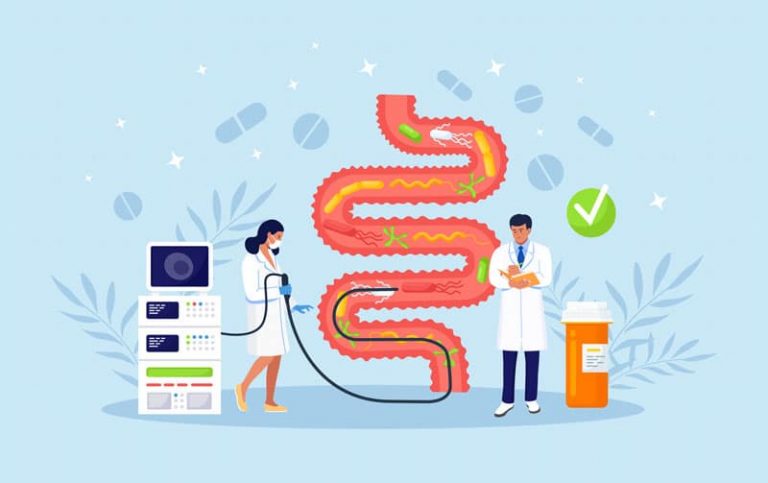Shares, oil, space research, or IT are the first things that come to mind when one hears the term “investment”. Anita Frauwallner and her son Bernd Assinger see the subject differently: They invest in the research of bacteria – and so in the health of mankind. Mag. Anita Frauwallner and her son Mag. Bernd Assinger in an interview with Bauchgefühl.
Bauchgefühl: What was the reason you decided to invest in the research of bacterial strains – not only time and knowledge, but of course also money?
Frauwallner: It was because of a very personal reason: my husband was suffering from bowel cancer. While we were fighting the disease, I got the feeling that instead of fighting the actual cause of the disease, conventional medicine was simply treating the symptoms. Two years after we had lost the battle with cancer, I met 2 impassioned people, an entrepreneur and a professor for microbiology who had just begun the development of probiotics. These probiotics were designed to act on the root of many evils, the gut. I felt that this just might be my calling in life, and many years later I decided to sell our pharmacy and invest in studies researching our gut bacteria.
Assinger: Classical medicine can in many cases accomplish amazing things. However, oftentimes heavy side-effects accompany the benefits. Our goal is to on the one hand create alternative therapies for chronic complaints (e.g. irritable bowel syndrome, chronic inflammatory bowel diseases, liver function disorders, etc.) and on the other hand fight the side-effects of heavy pharmaceuticals (e.g. diarrhoea after the application of antibiotics or chemotherapy).

Mag. Anita Frauwallner, founder of Institut AllergoSan, manages the family-run business together with her son Mag. Bernd Assinger, a former lawyer and head of the departments export and legal.
Bauchgefühl: Why did you decide to combine different bacterial strains for every field of application and then study these so-called multispecies probiotics in scientific studies? From a technical- as well as financial standpoint this is a far greater expenditure.
Assinger: If one combines them properly, bacterial strains develop an enormous potential – a well selected team can perform far better than a lone warrior. Our research has also shown that every individual bacterium has very different attributes: The inhibition of inflammation, strengthening of the gut barrier, the driving-out of pathogens, production of messenger substances, and short-chain fatty acids. As a combination we are left with the best possible, non-pharmaceutical, option for the treatment of various diseases.
Frauwallner: A good example is the strain Enterococcus faecium W54. This is one of the few strains which could be proven to truly multiply in the gut. Enterococcus faecium W54 is great at driving-out pathogenic germs which colonised the gut due to say an antibiotic therapy. They can even neutralise the toxins these pathogens produce. However, if one were to use this same strain to treat the gut barrier, thus a “leaky gut”, it would have almost no effect.
If in the future we are able to effectively treat severe diseases with OMNi-BiOTiC®, then for us, that would be synonymous with a truly new age of medicine.
Bauchgefühl: For you, where do the biggest risks lie when investing in new studies?
Frauwallner: One completely trusts a dedicated research team which has developed a theory or hypothesis regarding the effects one of our specially developed probiotics will have. However, one can’t see if the tests are going in the wrong direction after just 5 days. Such things become evident after 5 years, when the study results have been fully assessed. In this regard it is important to consider beforehand which bacterial strain might have potential to fight a specific disease.
Assinger: The financial risk associated with every study is also considerable. While there are some possibilities of financial support which are granted under strict conditions, naturally we as a company must cover a large portion of the costs.
Bauchgefühl: How does the investment in the research of our microbiome and the scientific proof of efficacy benefit you?
Assinger: From an economic standpoint it grants us the benefit of being able to develop new products for the treatment of specific conditions. It also allows us to promote our products with scientifically sound arguments. There are specific laws which predefine certain basic conditions which must be fulfilled and successful studies allow us to clearly phrase our products’ benefits.
Frauwallner: Naturally it also confirms one is doing meaningful work if one can positively influence severe diseases such as liver cirrhosis, but also Parkinson’s disease or bothersome conditions such as hay fever. It doesn’t cease to amaze me what our probiotics are capable of.
Bauchgefühl: What does the future look like to you? Which directions are you researching especially intensively in?
Assinger: A focus is on the research of probiotics which can be used to counteract the side-effects of chemotherapy and other heavy pharmaceuticals. But we also have ongoing studies regarding the therapy of Alzheimer’s and diabetes – that concerns a large portion of the population.
Frauwallner: If in the future we are able to effectively treat these severe diseases with OMNi-BiOTiC®, then for us, that would be synonymous with a truly new age of medicine.



























